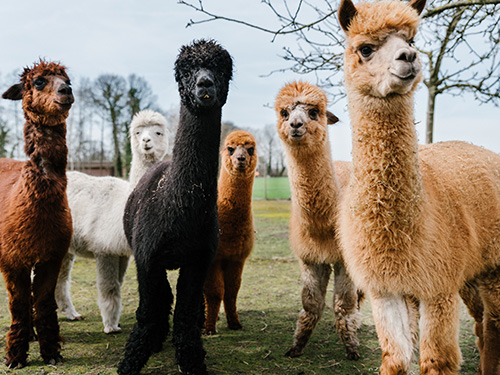Interested In Alpacas? Here Are The Dos And Don'ts Before You Buy
Aug 04, 2025

Alpacas are becoming a more popular creature to have on farms throughout Tennessee — some even turning into agritourism experiences.
Alpacas generate wool and attitude. Before trying your hand at owning an alpaca, it’s best to research what you might need to know before you get started.
Here are a few elements to think about before purchasing alpacas for your farm:
Alpacas aren’t solitary
While the responsibility of owning just one alpaca would be low, it wouldn’t benefit him or her. Alpacas are herd creatures, meaning they need companionship.
Ideally, it’s best to own multiple alpacas, but if your farm is small, two or three is a number to keep in mind.
Alpacas have decent lifespans, between 15 to 20 years. So having and caring for an alpaca is a long-term commitment. They cost anywhere between $500 to $2,000.
What they need on your farm
Alpacas do need some room to roam and pronk.
You need at least one half acre every two alpacas, but the more acreage, the better. These are also creatures that need a shelter to protect them from the elements, particularly in the summer when temperatures can blaze in Tennessee.
Fencing will definitely be a requirement — not necessarily because they will change the fence line — but because they can be susceptible to predators like coyotes. Around a 4 to 5-foot fence is ideal for alpacas.
Llamas, donkeys or livestock guardian dogs are ideal to keep with the herd.
What to feed your alpaca
Alpacas like to graze, typically on the pasture grass and hay.
A mineral block or pellets is also another good option for nutrition and other nutrients.
They require clean water at all times, and it’s best to let your alpacas rotate pasture land.
Needed upkeep for alpacas
You will need to sheer your alpaca at least once year, typically in the spring to prevent overheating during the long summer months.
They will also require a toenail trim anywhere between every six to eight weeks. Male alpacas will also need their fighting teeth trimmed.
Keep them on a regular vaccination and deworming schedule.
What you can get at Co-op
Co-op sells plenty of fencing supplies to help you get started to keep your alpacas safe. We also offer our own brand of alpaca food in the form of llama ration pellets. Made in La Vergne, it contains crude protein, fat, and fiber. It also includes calcium, phosphorus, salt and Vitamin E.
Alpacas generate wool and attitude. Before trying your hand at owning an alpaca, it’s best to research what you might need to know before you get started.
Here are a few elements to think about before purchasing alpacas for your farm:
Alpacas aren’t solitary
While the responsibility of owning just one alpaca would be low, it wouldn’t benefit him or her. Alpacas are herd creatures, meaning they need companionship.
Ideally, it’s best to own multiple alpacas, but if your farm is small, two or three is a number to keep in mind.
Alpacas have decent lifespans, between 15 to 20 years. So having and caring for an alpaca is a long-term commitment. They cost anywhere between $500 to $2,000.
What they need on your farm
Alpacas do need some room to roam and pronk.
You need at least one half acre every two alpacas, but the more acreage, the better. These are also creatures that need a shelter to protect them from the elements, particularly in the summer when temperatures can blaze in Tennessee.
Fencing will definitely be a requirement — not necessarily because they will change the fence line — but because they can be susceptible to predators like coyotes. Around a 4 to 5-foot fence is ideal for alpacas.
Llamas, donkeys or livestock guardian dogs are ideal to keep with the herd.
What to feed your alpaca
Alpacas like to graze, typically on the pasture grass and hay.
A mineral block or pellets is also another good option for nutrition and other nutrients.
They require clean water at all times, and it’s best to let your alpacas rotate pasture land.
Needed upkeep for alpacas
You will need to sheer your alpaca at least once year, typically in the spring to prevent overheating during the long summer months.
They will also require a toenail trim anywhere between every six to eight weeks. Male alpacas will also need their fighting teeth trimmed.
Keep them on a regular vaccination and deworming schedule.
What you can get at Co-op
Co-op sells plenty of fencing supplies to help you get started to keep your alpacas safe. We also offer our own brand of alpaca food in the form of llama ration pellets. Made in La Vergne, it contains crude protein, fat, and fiber. It also includes calcium, phosphorus, salt and Vitamin E.